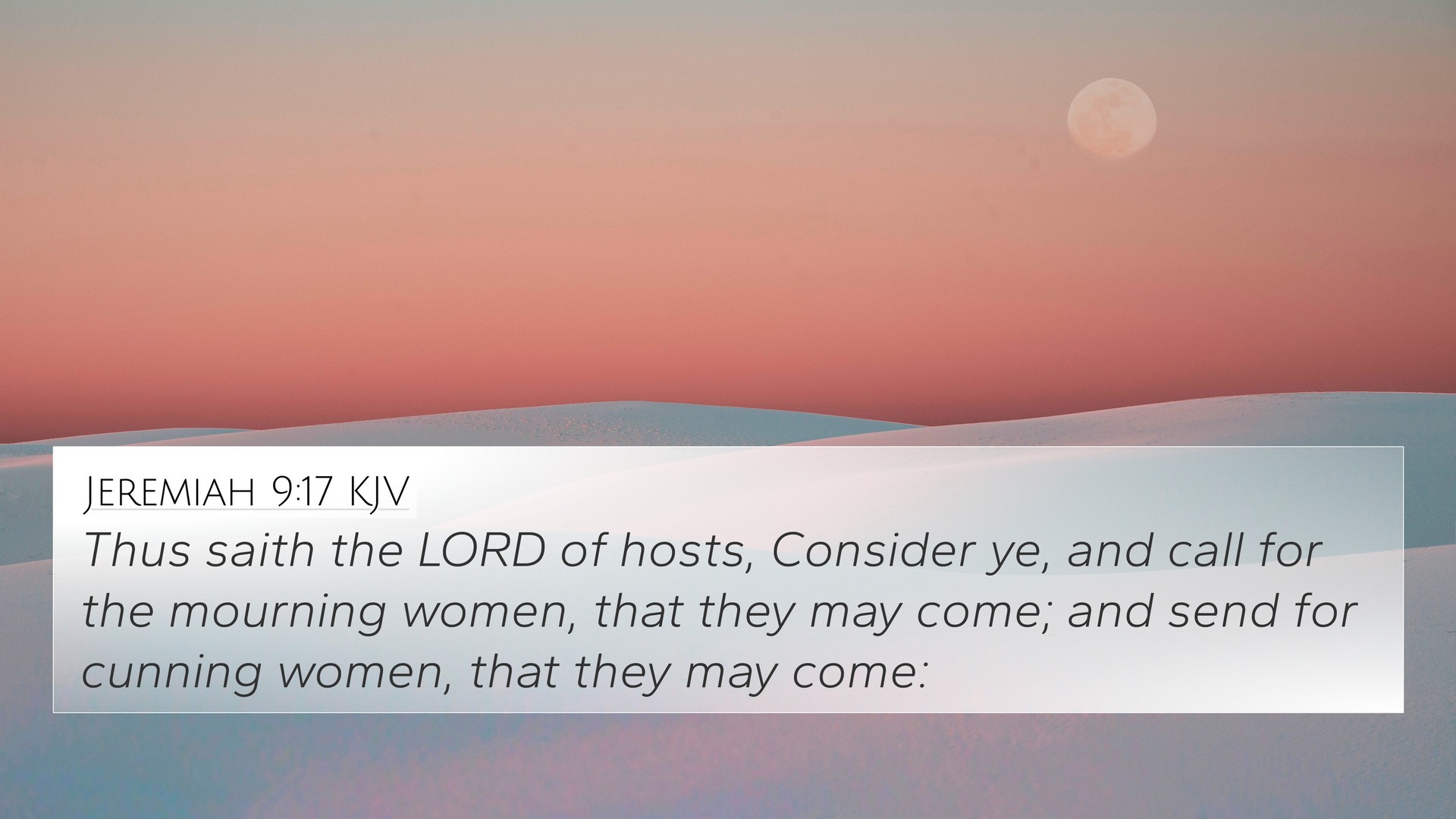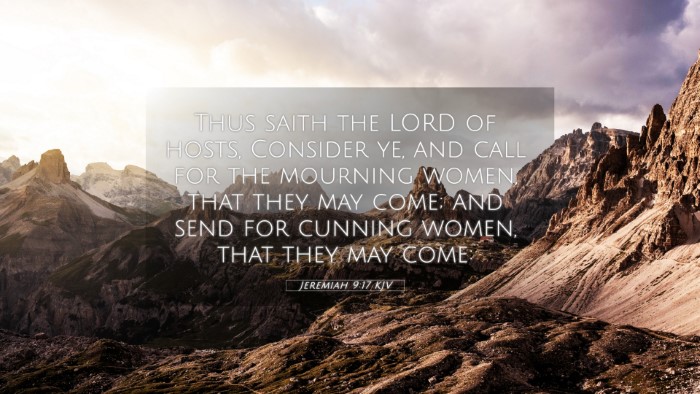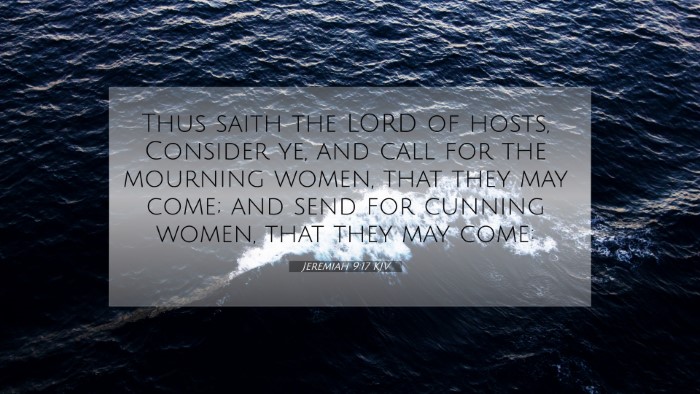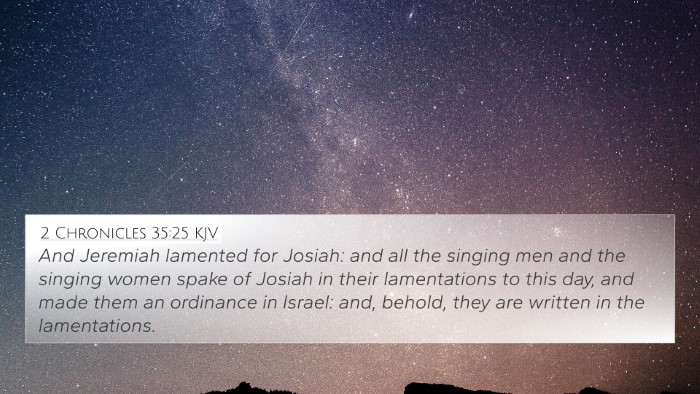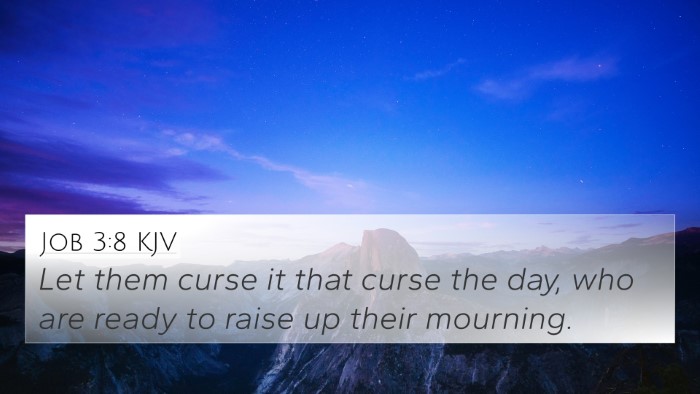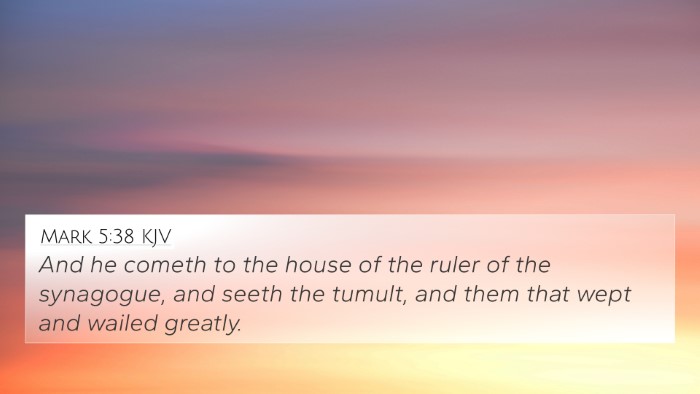Understanding Jeremiah 9:17
Jeremiah 9:17 states:
"Thus saith the Lord of hosts, Consider ye, and call for the mourning women, that they may come; and send for cunning women, that they may come:"
This verse serves as a powerful introduction to the themes of mourning and lamentation that permeate the prophetic writings of Jeremiah. The invitation for mourning women highlights the cultural context of grief in ancient Israel, as women played important roles in expressing communal sorrow.
Contextual Analysis
In the context of the book of Jeremiah, this verse emerges during a time of impending doom for Jerusalem. The people face consequences due to their persistent disobedience and idolatry. This call for mourning women underscores the need for solemnity in the face of such judgment.
Thematic Insights
This verse encapsulates several significant themes:
-
Mourning and Grief: The act of calling for mourners indicates a communal expression of grief, which aligns with the prophetic tradition of mourning over sin and judgment.
-
Divine Judgment: The Lord's command reflects a broader theme of divine judgment throughout the book, emphasizing the seriousness of Israel's transgressions.
-
Role of Women: The mention of "cunning women" implies recognition of their influence in society, suggesting that both men and women are called to respond to divine calls for repentance.
Connections with Other Bible Verses
There are several Bible verses that resonate with the themes in Jeremiah 9:17. Here are key cross-references:
-
Matthew 5:4: "Blessed are they that mourn: for they shall be comforted." This verse highlights the positive aspect of mourning, aligning with the call for lamentation in Jeremiah.
-
Lamentations 1:16: "For these things I weep; mine eye, mine eye runneth down with water..." This verse echoes the deep mourning expressed in Jeremiah, illustrating individual grief in a communal context.
-
Ezekiel 9:4: "And the Lord said unto him, Go through the midst of the city... and set a mark upon the foreheads of the men that sigh and that cry..." This reflects a divine command similar to Jeremiah's call, emphasizing repentance and mourning.
-
Joel 1:13: "Gird yourselves, and lament, ye priests: howl, ye ministers of the altar..." This consistency of lamentation practices reinforces the need for grief in wake of divine judgment.
-
Isaiah 53:3: "He is despised and rejected of men; a man of sorrows, and acquainted with grief..." This foreshadows Christ's suffering, linking the theme of mourning to the ultimate redemption narrative.
-
Revelation 21:4: "And God shall wipe away all tears from their eyes; and there shall be no more death..." This verse provides hope amidst mourning and judgment, emphasizing God's eventual restoration.
-
2 Corinthians 7:10: "For godly sorrow worketh repentance to salvation..." This emphasizes the redemptive nature of mourning, suggesting that true lament can lead to restoration.
Interpretative Analysis
Exploring Jeremiah 9:17 through various commentaries reveals deeper insights:
-
Matthew Henry: He emphasizes the importance of mourning in acknowledging sin and the grievous state of God's people. He sees the mourning women as symbolic of the need for genuine contrition.
-
Albert Barnes: Barnes notes that the call for "cunning women" refers to those who are skilled at lamentation and thus able to express the deep grief of the community effectively.
-
Adam Clarke: Clarke suggests that the gathering of mourners illustrates a communal responsibility to recognize their fallen state and to seek restoration with God through sorrow.
Practical Applications
Understanding the significance of Jeremiah 9:17 encourages us to reflect on the following:
-
Cultivating a Heart of Repentance: As seen in the Scriptures, true mourning over sin leads to genuine repentance and reconciliation with God.
-
Encouraging Collective Grief: Just as the Israelites were called to lament as a community, we too should create a culture that allows for collective mourning over spiritual failings.
-
Recognizing the Role of Women: Throughout the Bible, women have played pivotal roles in spiritual and communal life. Their voices and actions should be valued in spiritual matters today.
Conclusion
Jeremiah 9:17 is a profound call to consider the significance of mourning in the life of faith. It invites readers to engage deeply with themes of sorrow, repentance, and community. Through cross-references and diverse interpretations, this verse challenges us to reflect on our own hearts and the collective state of spiritual health within our communities.
Further Study
For those interested in exploring the connections between Bible verses, tools such as a Bible concordance or a Bible cross-reference guide can greatly aid in identifying the thematic links and enrich biblical study.
